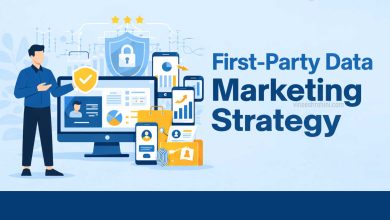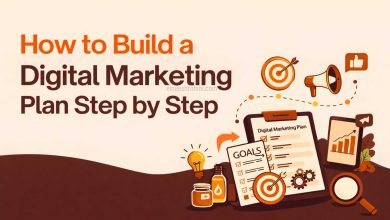Digital Marketing Automation : Tools and Benefits for Businesses – Comprehensive Guide 2025
Digital Marketing Automation : In the fast-paced world of digital marketing, businesses need to find ways to streamline their marketing efforts while maximizing their results. This is where digital marketing automation comes into play. Digital marketing automation refers to the use of software tools to automate repetitive marketing tasks, such as email marketing, social media posting, and lead generation. By automating these processes, businesses can save time, increase efficiency, and deliver more personalized marketing experiences to their customers.
Table of Contents
In this comprehensive guide, we will explore what digital marketing automation is, the tools that are commonly used, and the significant benefits that automation brings to businesses. Additionally, we will discuss how to effectively implement automation strategies and the impact it can have on a company’s overall marketing efforts.
What is Digital Marketing Automation?

Digital marketing automation is the use of technology to perform repetitive tasks in digital marketing, such as sending emails, managing social media posts, and tracking user behavior. The goal is to increase efficiency, enhance personalization, and improve customer engagement while reducing the need for manual intervention.
Also Read: The Power of Video Marketing: How to Go Viral in 2025 : Comprehensive Guide
At its core, automation is about leveraging software to handle time-consuming marketing activities, so businesses can focus on strategy, creative aspects, and customer relationships. It allows companies to deliver the right message at the right time and to the right audience, improving the likelihood of conversion and customer retention.
Key Areas of Digital Marketing Automation
Digital marketing automation can be applied across several aspects of online marketing. Below are the primary areas where businesses typically implement automation:
- Email Marketing
Email marketing is one of the most common and powerful forms of marketing automation. With tools like Mailchimp, ActiveCampaign, and HubSpot, businesses can automate email campaigns, segment email lists, send personalized content, and track performance. Automation tools enable businesses to send timely messages, follow-up emails, and nurture leads automatically based on user behavior and interactions. - Social Media Marketing
Managing multiple social media channels can be time-consuming. Social media automation tools like Hootsuite, Buffer, and Sprout Social enable businesses to schedule posts in advance, monitor engagement, and analyze results across different platforms from one dashboard. This helps businesses maintain an active presence on social media while saving time on manual posting. - Lead Generation and Nurturing
Automation plays a crucial role in generating and nurturing leads. With tools like HubSpot, Marketo, and Pardot, businesses can automate lead capture forms, follow-up emails, and lead scoring. By using automation to segment leads and tailor communications, businesses can provide more relevant content, increasing the chances of conversion. - Customer Relationship Management (CRM)
CRM platforms like Salesforce and Zoho CRM help businesses manage interactions with potential and existing customers. These platforms integrate with marketing automation tools to create a seamless workflow that helps businesses track customer behavior, schedule follow-up emails, and deliver personalized content based on a customer’s journey. - Content Marketing
Content marketing automation involves planning, creating, and distributing content automatically. Tools such as CoSchedule and SEMrush enable businesses to schedule blog posts, optimize content for SEO, and measure content performance. Automating content delivery ensures that your audience receives relevant material at the right time, improving engagement and driving more traffic to your website. - Ad Campaign Management
Running paid advertising campaigns across multiple platforms (such as Google Ads, Facebook, or LinkedIn) can be overwhelming. Automation tools like Google Ads automated bidding, AdEspresso, and WordStream help businesses optimize their ad spending and manage campaigns with minimal manual effort. These tools enable businesses to monitor ad performance, adjust bids, and automatically allocate budgets to the most successful ads.
Benefits of Digital Marketing Automation

The adoption of digital marketing automation brings numerous advantages to businesses. Let’s take a closer look at some of the key benefits:
1. Increased Efficiency and Time Savings
One of the most significant advantages of marketing automation is the time savings it offers. Manual tasks such as scheduling emails, posting on social media, and tracking leads can take hours each day. By automating these tasks, businesses can reduce the amount of time spent on repetitive activities, allowing their marketing teams to focus on strategy and high-value tasks.
For example, automated email campaigns can be set up once and run on their own without requiring constant monitoring or intervention. This efficiency allows businesses to achieve more with fewer resources, leading to cost savings in the long run.
2. Improved Customer Experience and Personalization
Automation allows businesses to deliver highly personalized experiences to customers at scale. By segmenting audiences based on behaviors, preferences, and demographics, businesses can send tailored messages that resonate with each individual.
For example, an e-commerce brand can use automation to send personalized product recommendations based on past purchases or browsing behavior. Similarly, businesses can automate follow-up emails after a purchase or interaction, creating a more seamless and engaging customer journey.
The ability to deliver the right message at the right time enhances customer satisfaction and increases the likelihood of conversions. Personalization has become a key driver of customer loyalty, and automation makes it easier to achieve.
3. Lead Nurturing and Higher Conversion Rates
Marketing automation helps businesses efficiently manage and nurture leads through the sales funnel. By automating lead capture, follow-up emails, and lead scoring, businesses can ensure that no lead is forgotten or neglected. Automation helps marketers engage with prospects at every stage of the buyer’s journey, providing them with the right information and incentives to move forward.
For instance, when a lead downloads an eBook or signs up for a webinar, an automated email sequence can be triggered, offering additional resources or inviting them to schedule a call with a sales representative. This continuous engagement keeps leads interested and increases the chances of conversion.
4. Data-Driven Decision Making
Automation tools provide businesses with valuable insights into the performance of their marketing campaigns. By collecting and analyzing data on customer behavior, email open rates, click-through rates, and website traffic, businesses can gain a deeper understanding of what is working and what needs improvement.
This data-driven approach allows businesses to optimize their marketing efforts, adjust their strategies, and make informed decisions based on real-time analytics. By constantly measuring and refining marketing campaigns, businesses can achieve better results and improve their return on investment (ROI).
5. Better Customer Retention
Marketing automation doesn’t stop after a customer makes a purchase. In fact, automation plays a crucial role in retaining customers by keeping them engaged with the brand through post-purchase communications. Businesses can set up automated email sequences to encourage repeat purchases, upsell complementary products, or ask for feedback on the customer’s experience.
Automated loyalty programs and rewards systems can also be implemented to incentivize customers to return. By nurturing customer relationships with relevant and timely communication, businesses can increase customer lifetime value and reduce churn.
6. Scalability
As businesses grow, so do their marketing needs. Automation provides a scalable solution to handle increasing workloads without requiring a proportional increase in resources. Whether you’re expanding into new markets, launching new products, or increasing your customer base, automation allows businesses to manage larger volumes of marketing tasks without compromising quality or efficiency.
For example, as your email list grows, you can still send personalized messages to each subscriber without additional manual work. Similarly, social media management tools allow businesses to handle multiple accounts and channels simultaneously, even as their audience expands.
Best Tools for Digital Marketing Automation
To help businesses get started with automation, here are some of the best tools available in the market:
- HubSpot: HubSpot is a comprehensive marketing automation platform that offers tools for email marketing, social media management, lead generation, CRM, and analytics. It is ideal for businesses looking for an all-in-one solution.
- Mailchimp: Known for its user-friendly interface, Mailchimp is a popular email marketing tool that also offers automation features, including email segmentation, automated campaigns, and detailed analytics.
- ActiveCampaign: ActiveCampaign offers powerful email marketing automation, CRM tools, and advanced customer segmentation. It’s perfect for businesses that want to automate their lead nurturing and sales processes.
- Hootsuite: Hootsuite is one of the leading social media management platforms, allowing businesses to schedule posts, track social media performance, and engage with their audience across multiple channels.
- Marketo: Marketo is a robust marketing automation platform that focuses on lead management, email marketing, and analytics. It’s ideal for larger businesses and enterprises with complex marketing needs.
- Salesforce Marketing Cloud: Salesforce is a highly popular CRM and marketing automation platform, providing tools for personalized marketing, email campaigns, social media management, and data-driven decision-making.
- Pardot: Pardot, a Salesforce product, is a marketing automation tool tailored for B2B companies. It offers advanced lead nurturing, email marketing, and ROI measurement tools.
- Zoho CRM: Zoho CRM integrates well with other marketing tools and offers features for automating lead management, email campaigns, and customer communications.
How to Implement Digital Marketing Automation in Your Business

To implement digital marketing automation successfully, follow these steps:
- Set Clear Objectives: Start by identifying what you want to achieve with automation, whether it’s lead generation, customer retention, or improving email marketing performance. Set measurable goals to track progress.
- Choose the Right Tools: Select automation tools that align with your business needs and marketing objectives. Ensure that the tools integrate well with your existing systems (such as your CRM or e-commerce platform).
- Segment Your Audience: Successful automation relies on understanding your audience. Segment your contacts based on their behaviors, demographics, and preferences to send targeted messages that are more likely to resonate with them.
- Create Personalized Content: Develop content that speaks to the needs of your audience. This could include personalized email sequences, social media posts, and landing pages that align with specific customer journeys.
- Monitor and Optimize: Continuously monitor the performance of your automated campaigns. Use analytics to make data-driven adjustments and optimize your marketing efforts for better results.
Conclusion
Digital marketing automation is a game-changer for businesses looking to streamline their marketing efforts, improve efficiency, and deliver more personalized customer experiences. By automating repetitive tasks such as email marketing, lead nurturing, and social media management, businesses can save time, increase engagement, and achieve higher conversion rates.
Buy Now : Professional Digital Marketing Course
The right marketing automation tools can provide valuable insights, improve decision-making, and help businesses scale their efforts as they grow. However, it’s important to implement automation thoughtfully, ensuring that campaigns are aligned with business objectives and that customer interactions remain personalized and relevant.
Incorporating automation into your digital marketing strategy is not just a way to save time—it’s a strategic move that can significantly enhance your marketing performance, boost customer satisfaction, and ultimately drive business growth.



